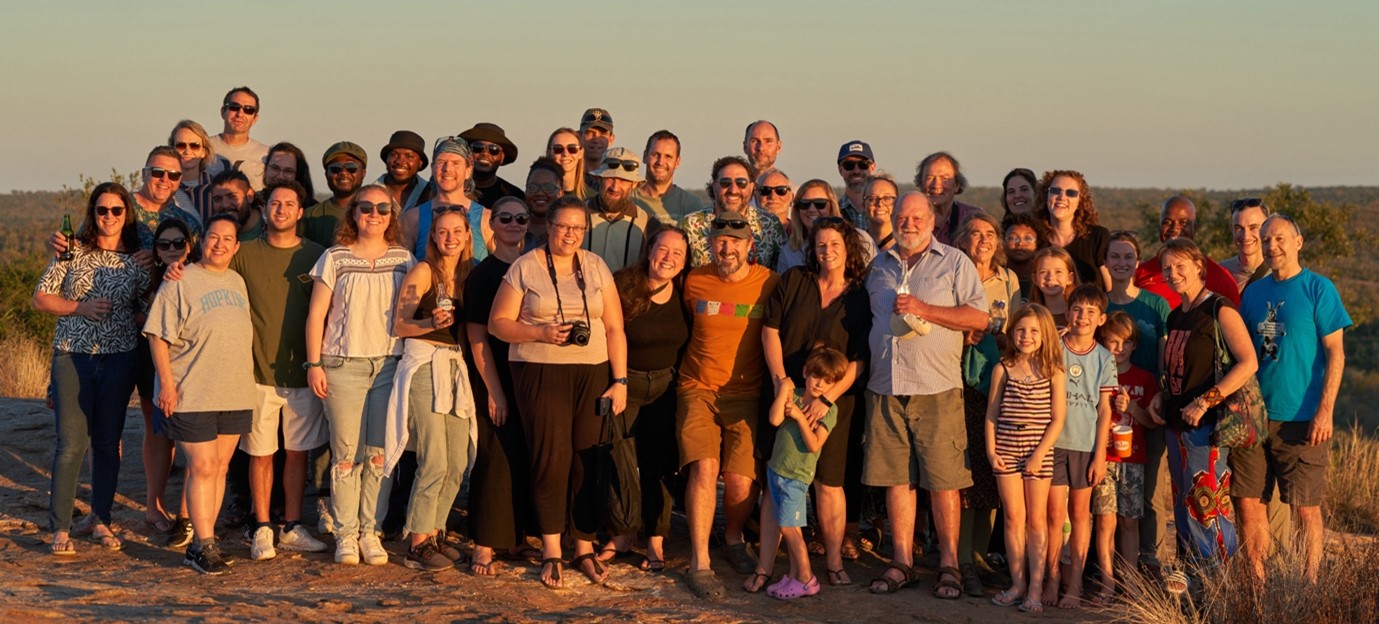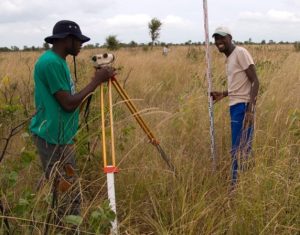
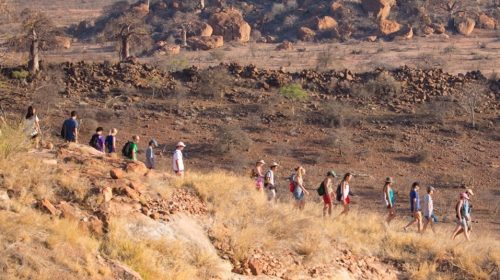
The groundwork was laid in 2001 – 2003 with an incredible investment by Deedra McClearn, Nora Hughes, Mo Donnelly, Gary Hartshorn, Kevin Rogers, Ed February, and SANParks crew Danie Pienaar, Stef Freitag, Harry Biggs, Rina Grant, to name a few. Deedra, as the first director of OTS South Africa, spent significant time and energy creating relationships that have lasted two decades, but also transplanting the tried and trusted OTS education model to South Africa. Given that this was a new venture and OTS an unknown entity to UCT, WITS, and SANParks, the early years were key in demonstrating proof of concept but also ensuring that we ran a safe course of high quality, sending all students home with their fingers and toes intact. Kevin Rogers took over as director in 2007 and continued Deedra’s efforts to increase the impact on early career South African students, but also sharpening the focus on relevant research. It was during this time that we invested further in infrastructure that would render the course and staff experience more sustainable and consolidate somewhat.
Consolidation and growth
Since 2007, we have grown to include a Global Health (One Health) course in June/July and an NSF-funded International Research Experience for Students (IRES). The Global Health course focused on access to health as a human rights issue and the social determinants of health in an industrializing country. The IRES, on the other hand, focused our efforts to make a more significant contribution to long-term biodiversity monitoring in the Kruger Park, particularly the effects of elephants and fire on biodiversity.
Developing partnerships to expand impacts
In 2011 we felt that we could do more for human capital development in the biodiversity sector, so we partnered with the Nsasani Trust and SANParks to create the Skukuza Science Leadership Initiative to amplify our local impact. Central to the goals of the SSLI were to:
- Run field-based transformative education and training courses to develop this generation of conservation ambassadors, in line with our national strategy for HCD in the biodiversity sector;
- Contribute significantly to filling key gaps in biodiversity monitoring for key national partners;
- Develop a research and education “green” facility as a platform for learning and exchange, focusing on the cradle-to-cradle philosophy exemplifying sustainable building practices;
- Fair trade education and social justice: increasing beneficiation for local small business partners and increasing the benefits to underserved communities.
Long-term research
Over the last decade, we have increased our focus on long-term data collection in three key research themes:
- Understanding the effect of land use change on biodiversity, ecosystem services, and the emergence of zoonotic diseases and carbon sequestration: making a contribution to long-term biodiversity monitoring in the EFTEON savanna landscape;
- In partnership with SANParks, Universities of Florida, and Eswatini, All Out Africa, and the Nsasani Trust, running Women in Science courses to contribute to the BROWSE project (Biodiversity Research into Wildlife and Savanna Ecosystems), assessing the effects of elephants and fire on vegetation and the consequence trophic cascades; and
- Lastly, in response to the needs of SANParks Scientific Services, we now also focus on the importance of understudied temporary bodies of water in the KNP. Each of these themes is now enhanced by Don Tye, Director of Innovation, focus on innovation in research, adding passive, acoustic monitoring to each of the research gradients.
Aside from running field courses of exceptional quality, we are particularly proud the impact we have had on early career South African students, providing exposure to the incredible landscapes for students that have not been afforded that privilege before, providing opportunities for students to collaborate with our outstanding local scientists, and establishing peer networks to launch their careers locally and abroad – so too, the collaborating in the building of a world-class field station and the publishing of over 60 papers, many focusing on the research needs of the KNP and Conservation in South Africa.
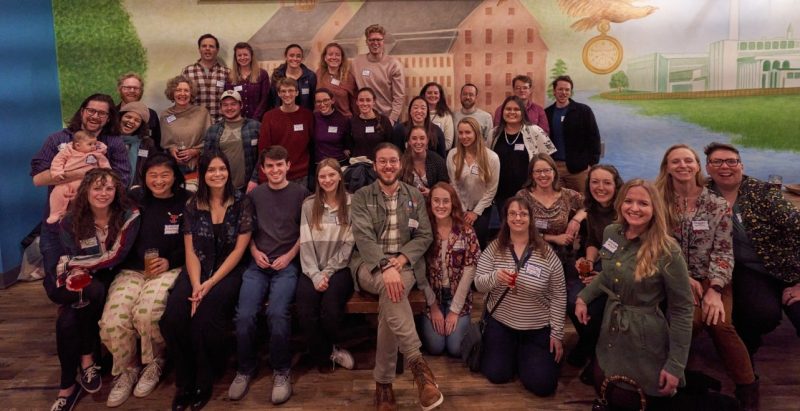
To celebrate the OTS South Africa legacy, we held three events, two in the U.S. in November last year and a massive celebration at Skukuza in early May 2024. We were grateful to have 55 alumni attending the Boston event, hosted at the Mighty Squirrel Brewery, representing over 20 courses. At the event in Durham, attended by various Duke and Davidson University luminaries, we were extremely fortunate to have Professor Emeritus Richard White, who spoke of his time with OTS. He spoke about the founding principles of OTS: to gain experience in novel environments, as well as traveling to make one a better citizen and to make a contribution to the host country, principles we adhere to, to this day. Key to the conversation, however, was capturing the sense of adventure that is inherent in every OTS course.
The three-day event in Skukuza, Kruger National Park, was an event befitting a celebration of 20 years. Some 20 alumni and academics traveled internationally, along with 30 local visitors to be with us, with no less than 4 alumni from the very first course. The event kicked off with a customary OTS sundowner. Following a tour of the campus by Donovan Tye, Field Station Director, Nick Whitcutt, the architect of the SSLI campus, and Thandeka Mathenjwa, Field Station Manager, the days were filled with game drives, sundowners, and a magnificent Aggyshadow Braai. To really enhance the celebrations, we were joined by the Mabarhule Youth choir, and the festivities lasted late into the evening.
It is a real blessing to have the continued engagement of such an incredible range of African Ecology and Conservation alumni.
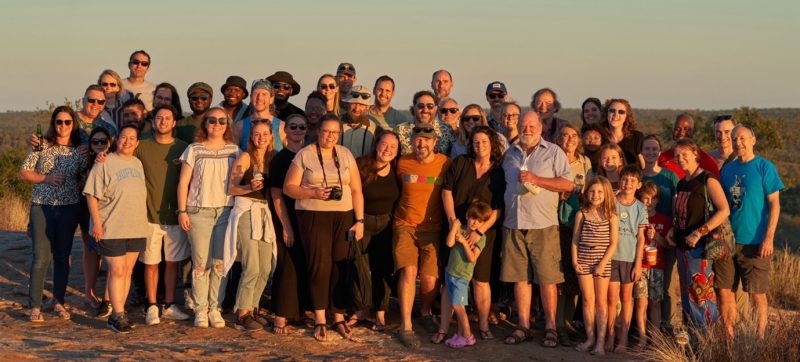
In honor of the late Max Edkins, an OTS South Africa 2005 alum and a global youth leader in climate change education, who passed on a Boeing Flight in Ethiopia, we have established the Max Edkins Scholarship Fund in his memory. This fund will be used to provide scholarships to underrepresented students to enroll in the African Ecology and Conservation semester course as well as for those participating our Conservation Leadership programs. These Conservation Leadership programs (e.g. the Women in Science course) focus on dismantling the barriers students face in entering the STEM fields and on developing both competence and character. The aim is to foster the next generation of conservation leaders: ethical and flexible problem solvers who are capable of grappling with complex environmental challenges facing humanity in the 21st Century. Please contact me for any details. Our goal is to raise $50,000 annually for the fund.

